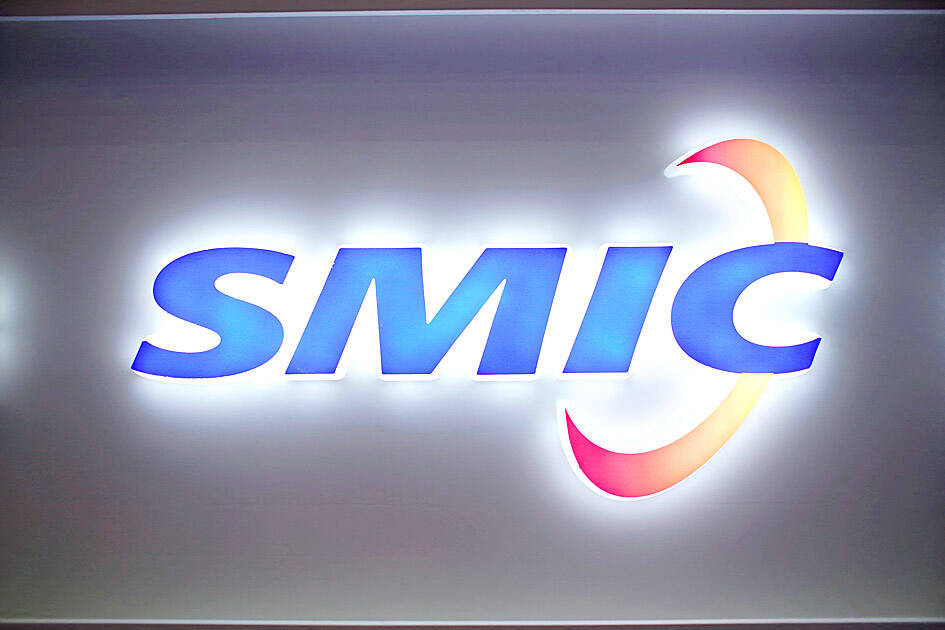China’s top chipmaker, Semiconductor Manufacturing International Corp (SMIC, 中芯國際), yesterday said that its profit last year plunged significantly from the previous year, against a backdrop of surging trade tensions between the US and China.
“Unaudited profit attributable to owners of the company was US$492.7 million in 2024, a decrease of 45.4 percent from US$902.5 million in 2023, mainly due to the decrease of investment income and financial income,” SMIC said in a filing to the Hong Kong Stock Exchange.
Profit in the final quarter of last year also slumped, the filing showed, dropping 38.4 percent year-on-year to US$107.6 million, compared with analysts’ estimate of US$193.45 million, according to LSEG data.

Photo: Reuters
Meanwhile, SMIC’s fourth-quarter revenue grew 31.5 percent to US$2.2 billion, it added, compared with market expectations of US$2.18 billion, according to LSEG.
The company reported a gross margin of 22.6 percent in the fourth quarter, compared with 16.4 percent a year earlier.
SMIC said that, “based on the premise that there are no significant changes in the external environment,” it expects revenue growth in the year ahead “to be higher than industry average in the same markets.”
SMIC’s business remains overwhelmingly focused on mature-node chips for consumer electronics and home appliances, with advanced manufacturing projects, such as Huawei Technologies Co’s (華為) smartphone chips, representing only a marginal portion of its revenue.
The company has ramped up capital investments over the past few years to expand its production capacity and bolster China’s domestic semiconductor capabilities.
SMIC’s capital expenditure surged to US$7.3 billion in 2023 from US$4.5 billion in 2021, reflecting its aggressive expansion strategy. The company invested another US$7.33 billion last year, its latest earnings release showed.
Additional reporting by Reuters

Taiwan will prioritize the development of silicon photonics by taking advantage of its strength in the semiconductor industry to build another shield to protect the local economy, National Development Council (NDC) Minister Paul Liu (劉鏡清) said yesterday. Speaking at a meeting of the legislature’s Economics Committee, Liu said Taiwan already has the artificial intelligence (AI) industry as a shield, after the semiconductor industry, to safeguard the country, and is looking at new unique fields to build more economic shields. While Taiwan will further strengthen its existing shields, over the longer term, the country is determined to focus on such potential segments as

UNCERTAINTY: Innolux activated a stringent supply chain management mechanism, as it did during the COVID-19 pandemic, to ensure optimal inventory levels for customers Flat-panel display makers AUO Corp (友達) and Innolux Corp (群創) yesterday said that about 12 to 20 percent of their display business is at risk of potential US tariffs and that they would relocate production or shipment destinations to mitigate the levies’ effects. US tariffs would have a direct impact of US$200 million on AUO’s revenue, company chairman Paul Peng (彭雙浪) told reporters on the sidelines of the Touch Taiwan trade show in Taipei yesterday. That would make up about 12 percent of the company’s overall revenue. To cope with the tariff uncertainty, AUO plans to allocate its production to manufacturing facilities in

COLLABORATION: Given Taiwan’s key position in global supply chains, the US firm is discussing strategies with local partners and clients to deal with global uncertainties Advanced Micro Devices Inc (AMD) yesterday said it is meeting with local ecosystem partners, including Taiwan Semiconductor Manufacturing Co (TSMC, 台積電), to discuss strategies, including long-term manufacturing, to navigate uncertainties such as US tariffs, as Taiwan occupies an important position in global supply chains. AMD chief executive officer Lisa Su (蘇姿丰) told reporters that Taiwan is an important part of the chip designer’s ecosystem and she is discussing with partners and customers in Taiwan to forge strong collaborations on different areas during this critical period. AMD has just become the first artificial-intelligence (AI) server chip customer of TSMC to utilize its advanced

Chizuko Kimura has become the first female sushi chef in the world to win a Michelin star, fulfilling a promise she made to her dying husband to continue his legacy. The 54-year-old Japanese chef regained the Michelin star her late husband, Shunei Kimura, won three years ago for their Sushi Shunei restaurant in Paris. For Shunei Kimura, the star was a dream come true. However, the joy was short-lived. He died from cancer just three months later in June 2022. He was 65. The following year, the restaurant in the heart of Montmartre lost its star rating. Chizuko Kimura insisted that the new star is still down